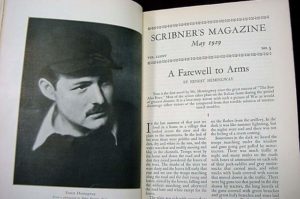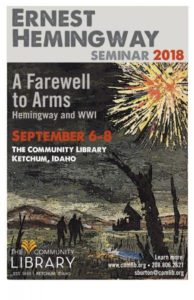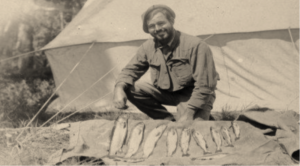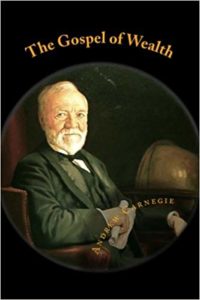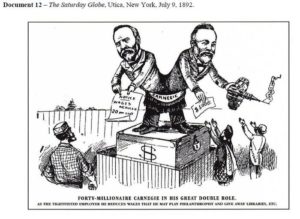The Broken Places
September 10, 2018The Hemingway Seminar concluded on Saturday, Sept. 8th, at the Community Library in Ketchum, with a focus on Hemingway’s third book, A Farewell to Arms. At the ending presentation, University of Maryland english professor David Wyatt discussed the various 47 endings Hemingway considered, including an ending Hemingway’s friend, F. Scott Fitzgerald, pleaded with him to use.
If people bring so much courage to this world the world has to kill them to break them, so of course it kills them. The world breaks everyone and afterward many are strong at the broken places. But those that will not break it kills. It kills the very good and the very gentle and the very brave impartially. If you are none of these you can be sure it will kill you too but there will be no special hurry.
Hemingway would ultimately choose a different ending, and include 68 more pages after this one, which is found on page 216 in A Farewell to Arms, The Hemingway Library Edition, Includes the Author’s 1948 Introduction, Early Drafts, and All of the Alternative Endings (2012).
The Hemingway Society
The Bi-Annual conference moves to Wyoming in 2020 after Paris in 2018.
“We will begin in Sheridan, Wyoming, where A Farewell to Arms was finished and end in Cooke City, MT, from where final drafts of Death in the Afternoon and To Have and Have Not were mailed, with stops at the Little Bighorn Battlefield, Yellowstone National Park and Hemingway pertinent towns – Cody, WY and Red Lodge, Montana. The Hemingway Society invites you to join us in 2020 to celebrate the 80th anniversary of For Whom the Bell Tolls, experience some of the America’s most pristine wilderness, and explore the final frontier of Hemingway scholarship.”
The gospel of giving.
Exploiting tax codes in the name of philanthropy.
“For every foundation that existed in 1930, there are now five hundred.”
Just Giving: Why Philanthropy is Failing Democracy and How It can Do Better,
Rob Reich, Stanford political science professor
David Callahan:
“It’s not just that the megaphones operated by 5019c0(3) groups and financed by a sliver of rich donors have gotten louder and louder, making it harder for ordinary citizens to be heard. These citizens are helping foot the bill.
When it comes to who gets heard in the public square ordinary citizens can’t begin to compete with an activist donor classes. How many very rich people need to care intensely about a cause to finance megaphones that drown out the voices of everyone else? Not many.”
Gospels of Giving For the New Gilded Age/Are today’s donor classes solving problems, or creating new ones?
By, Elizabeth Kolbert
https://www.newyorker.com/magazine/2018/08/27/gospels-of-giving-for-the-new-gilded-age
Kolbert:
The idea that both liberals and conservatives are exploiting the tax code is small consolation.
In the spring of 1889, Andrew Carnegie published an essay on money. If possession confers knowledge, then there was no greater expert on the subject: Carnegie was possibly the richest American who ever lived.
The “Gospel” opened with a discussion of inequity. This was the Gilded Age, and, even as most Americans were struggling to get by, the one-per-centers were putting up “cottages” in Newport. The disparity was, in Carnegie’s view, unavoidable. It was the price of progress, and progress, ultimately, benefitted everyone.
“The Gospel of Wealth” has been called the “ur-text of modern philanthropy.” It advocated a new kind of giving, a form of charity that wasn’t charity but something more pragmatic and, at the same time, more ambitious—a giving aimed, in Carnegie’s words, at improving “the general condition of the people.” Acting on his own advice, Carnegie went on to endow Carnegie Hall, the Carnegie Foundation, the Carnegie Endowment for International Peace, the Carnegie Institute of Technology (now part of Carnegie Mellon University), and more than twenty-five hundred local libraries. His contemporaries financed the Rockefeller Foundation, the Russell Sage Foundation, the Field Museum, and the University of Chicago.
The “Gospel” also prompted the ur-critiques of philanthropy. In 1890, the Reverend Hugh Price Hughes, a Methodist minister, wrote that, while he was sure Carnegie was “a most estimable and generous man,” his “Gospel” represented a “social monstrosity” and a “grave political peril.” William Jewett Tucker, a professor of religion who would later become the president of Dartmouth, was no less horrified. What the “Gospel” advocated, Tucker wrote, was “a vast system of patronage,” and nothing could “in the final issue create a more hopeless social condition.” To assume that “wealth is the inevitable possession of the few” was to evade the essential issue: “The ethical question of today centres, I am sure, in the distribution rather than in the redistribution of wealth.”
To critics, the Homestead strike made explicit the inconsistency of Carnegie’s position. How could a person ruthlessly exploit his employees and, at the same time, claim to be a benefactor of the toiling masses? The Saturday Globe, a Utica-based weekly, published a cartoon showing two Carnegies, conjoined at the hip. One, smiling, handed out a library and a check; the other held out a notice telling workers that their pay had been slashed. “As the tight-fisted employer he reduces wages that he may play philanthropist,” the caption read.
It is difficult to say what fraction of philanthropic giving goes toward shaping public policy. Callahan estimates that the figure is somewhere around ten billion dollars a year. Such an amount, he says, might not sound huge, but it’s more than the annual contributions made to candidates, parties, and super-pacs combined. The result is doubly undemocratic. For every billion dollars spent on advocacy tricked out as philanthropy, several hundred million dollars in uncaptured taxes are lost to the federal treasury.
Instead of promoting equality, Reich worries, tax subsidies for philanthropy may actually be doing the reverse. He cites, in particular, local-education foundations, or lefs. These are, essentially, souped-up PTAs, formed to supplement public-school budgets, and they’ve grown dramatically in recent years. Some lefs raise only enough money to buy paint sets or musical instruments, but some, in more affluent districts, raise thousands of dollars a pupil. In the town of Hillsborough, California, just north of Stanford, Reich reports, parents of public-school students get a letter at the start of the year asking for a contribution of twenty-three hundred dollars for each child enrolled. While the contributing parents can’t dictate exactly how the money will be spent, Reich writes, it’s easy to imagine groups of parents pressing the district to hire specialized teachers or to purchase sophisticated equipment that “can be targeted to benefit their own children.” This arrangement, in his view, exacerbates existing inequities in school funding, and, since contributions to lefs are tax deductible, rich districts are, in effect, receiving a subsidy from other taxpayers.
The New Yorker/The Mail
Sept. 10, 2018:
As someone who is working to elect a Democrat in a Republican-held congressional district, I asked myself why none of the philanthropists mentioned in Kolbert’s article are working to protect the most basic mechanism of democracy: the right to vote. According to the Brennan Center for Justice, forty-one states have outdated voting machines that are vulnerable to hacking and breakdowns. Officials in thirty-three states told researchers that they didn’t have enough funds to upgrade their systems before 2020. If Silicon Valley is happy to sell voting systems to the government, shouldn’t tech billionaires feel some responsibility for safeguarding them and fixing them, since hacking threatens the liberal, free-market democracy that enabled their companies to succeed in the first place? My first thought upon finishing Kolbert’s article was: Will anyone rescue our democracy with a funds-for-secure-elections drive? Because the federal government hasn’t done so, and apparently won’t.
Sharona Muir
Perrysburg, Ohio
Sweet love.
https://www.instagram.com/p/BnU3I_YFJjk/?utm_source=ig_embed&utm_campaign=embed_loading_state_control
Indivisible wholeness.
“The whole of humanity, “forms, so to speak, a single living being.” In Christ we form a single body, we are all “members of one another.” For the one flesh of humanity and of the earth “brought into contact” in Christ “with the fire” of his divinity, is henceforward secretly and sacramentally deified.”
Olivier Clément, The Roots of Christian Mysticism, 2nd ed. (New City Press: 2013), 46.
“Even science confirms that there is no clear division between matter and spirit. Everything is interpenetrating. As Franciscan scientist and theologian Ilia Delio often says, “We are in the universe and the universe is in us.” Christ’s very nature mirrors this universal reality, that we are all one, just as he is one within himself.”
-Richard Rohr, Center for Action and Contemplation
~
Presence of Spirit Everywhere, Dr. Ernest Holmes
The Spirit of God, which is Life, is present everywhere. Like the air we breathe, It presses against us. On the mountaintop, in the valley, in the desert, and in the ocean–there is no place where Life is not. Therefore, in whatsoever direction we move, we move in God. In God we live, move, and have our being.
God is one undivided and indivisible Wholeness, one divine and spiritual Presence, our universal and all-encompassion Person. Perhaps it is a little difficult for us to understand the meaning of such an all-inclusive Person, but the very fact that we are personalities presupposes such a conclusion. Our endeavor, then, is not so much to find God, to discover the Divine source of our personal being, as it is to become acquainted with God.
Today, I consciously commune with the Spirit. I know that it presses against me and flows through me. I endeavor to feel this presence as a living reality in my life. Knowing that the Divine Presence is in everyone, I sense that the Spirit is in everyone I meet. I do my best to respond to this Spirit. Seeing It everywhere, I keep my consciousness open and alert that I may better understand the union of all life with its pure and perfect Source.
~
‘There is no one in this world who is not looking for God. Everyone is trudging along with as much dignity, courage and style as the possibly can.’ -Hafiz
“It’s nice to know we are all looking for God. It’s nicer still to know that we can find God in each other. After all, we’re all doing the best we can, with as much courage and style as we can. […] I have truly found that judgments, which are usually condemnations, are built on assumptions. And assumptions are built on quicksand–they suck up my good sense and my loving heart, so that as I drag someone down, I go down, too.”
-Rev. Katherine Saux, Science of Mind
He who possesses one [of the virtues] and does not offend the others, possesses all; and he who offends one, possesses none and offends all; and every one of them confounds vices and sins.
-St. Francis of Assisi
